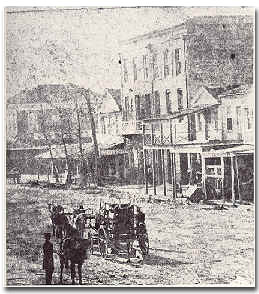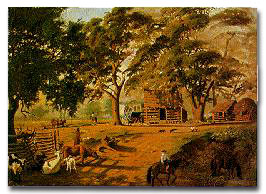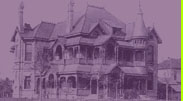THE FORMATIVE YEARS (1840-1850)
The first decade in the history of Houston came during a period national expansion and exploration. The population of the United States in 1840 was 17,069,453, and that of Texas less than 100,000 with Harris County having under 2,000. The population figures for Harris County and Texas are estimates since there was no official census in the Republic. The nation's first normal transatlantic steamer service was inaugurated in 1840, and the first covered wagon train via the Oregon Trail reached California in 1841. Federal employees succeeded in their long efforts to get their work week reduced to 60 hours, and a law was passed limiting the factory work of children to 10 hours per day, but it was never enforced. Edgar Allen Poe created quite a stir when he wrote a fictitious story the "New York Sun" about a balloon crossing the Atlantic with passengers from Europe to America.
The "Morning Star" could report only a disintegrating community morale by April, 1840, and the young municipal government lacked the vitality to meet the issues. Thus it was that on April 4, 1840, seven men assembled at 10:00 o'clock in the morning at Carlos' City Exchange, accepting a life-or-death, or let it die forever. The seven men were Thomas M. League, Henry R. Allen, George Gazely, John W. Pitkin, Charles Kesler, E. S. Perkins, and Dewitt C. Harris. This meeting resulted in the formation of a Chamber of Commerce, through which the people of Houston might enter into a voluntary teamwork to deal with their problems. The "Morning Star" of April 6, 1840, carried an official notice of the April 4th organization meeting of the Houston Chamber of Commerce, thus culminating a year and a half of frustrating experiences as conditions in the community grew steadily worse. According to this report, George Fisher, who had some knowledge of Chambers of Commerce, was present to explain the purpose of the meeting and the procedures necessary to create a Chamber of Commerce. D.C. Harris offered the following resolution, which being accepted, was adopted:
"Resolved, That all persons, being Wholesale Merchants of the City of Houston, or the County of Harris, and paying license as such, who may enroll their names with the Secretary, and pay into the hands of the Treasurer the sum of twenty dollars, of the Promissory Notes of the government of Texas, be admitted and constituted members of the Houston Chamber of Commerce, with the same privileges as the original members embraced in the Act of Incorporation, approved on the 28th of January, 1840, until otherwise provided by the By-laws, or by a subsequent of the body, for the admission of members."
This notice was signed by E. S. Perkins as president and John W. Pitkin as secretary for the other organizing members, including all those present, with George Fisher as an honorary member. The membership was doubled by this first action of the new organization and as a result the following were admitted: Francis R. Lubbock, Henry Kesler, J. DeCordova, J. Hart, Charles A. Morris, and John Carols. The Houston Chamber of Commerce became the coordinator of community development for a frontier village that was dying. The urgent task was sheer survival. Visions of greatness and dreams of glory then lay far in the future.
Commerce, cut off with the credit, soon began to move again. Stocks in stores were still low, but now because of a growing trade with the interior, started to be built up. Summer came and went without an epidemic. Then Houston discovered a new and stronger and more enduring stimulator for its economy than even the capital, so recently moved to Austin, had been. Houston became the port, at the head of tidewater on Buffalo Bayou, for Stephen F. Austin's inland colonists.
Already the Chamber of Commerce was making its influence felt in other ways. Editor D. H. Fitch had written optimistically in the "Morning Star" on April 6, 1840: "A Chamber of Commerce has been organized in this city. This evidence of the growing importance and extent of the commerce of Houston is gratifying; and the gentlemen whose names appear among the officers and members of this association are of such a character as to ensure the successful accomplishment of the benefits and design intended by the organization."
Thus began the story of Houston, a matter of history demonstrating the possibilities when people of a community work together to attain worthwhile goals. Since 1840, Houston has arisen from a beginning that was almost unbelievably inauspicious to the great city it is today.
The Allen brothers began to promote Houston's prospects with a superlative flair in newspapers circulated throughout the North and East, but even their most extravagant promises have long since been over-shadowed by the attainments of their dream city. Stagecoach service followed early waterway improvements. A toll ferry crossed Bray's Bayou from Houston to Harrisburg. Stores, a school and jail replaced "frontier justice." Emphasizing the growing importance of navigation on Buffalo Bayou, Mayor John Andrews and City Aldermen officially established the "Port of Houston." The title admittedly was then mote anticipatory than actual, but it led to the granting by the Congress of the Republic of Texas on January 29,1842, to Houston the right to remove obstructions from the twisting and snag-filled and sand-bar-strewn Buffalo Bayou, and the Houston Chamber of Commerce raised $2,000 to start a program of channel improvement that is still under way.
Problems were piling up on the new Republic of Texas, with an unruly army, threats of invasion from Mexico, financial problems, and widespread frauds. Colonization was encouraged, and a number of large land grants were made. Armed forces from Mexico took possession of San Antonio and other nearby points in March, 1842, but retired across the Rio Grande before a counter force could be organized. Later in the year, another Mexican force captured San Antonio, but again retreated to the border.
 Concerned by these invasions, President Houston ordered the seat of government moved back to Houston. His action resulted in the so-called "archive war" in which the people of Austin fought to maintain the archives in their town. After a few shots were fired, the seat of government was moved instead to Washington-on-the-Brazos but was returned to Austin in 1844.
Concerned by these invasions, President Houston ordered the seat of government moved back to Houston. His action resulted in the so-called "archive war" in which the people of Austin fought to maintain the archives in their town. After a few shots were fired, the seat of government was moved instead to Washington-on-the-Brazos but was returned to Austin in 1844.
By 1844, the Chamber of Commerce could reflect with pride on short-term progress. Business was brisk and commerce carried forward new momentum from year to year. Frame buildings began to replace the tents in which the business of the community was transacted for several months. The Houston Academy opened with one hundred students enrolled. Further manifesting it interest in culture, the Chamber of Commerce encouraged the creation of the Houston Saengerbund as the city's first musical origination. To dramatize for Houstonians the growing importance of their city, and to call Houston to the attention of wealthy interests in the North, and East, a large steamboat, the "Constitution," was brought to the Port of Houston. Since the ship could not turn in the yet-narrow channel, it had to be backed downstream to turn in a wider part of the bayou which came to be called "Constitution Bend."
Although Texas had attained security in its independence, there was a growing undercurrent of feeling that its future development would best be achieved under United States sovereignty. The admission of Texas to the national federation was delayed because of the slavery issue, but the Congress of the United States adopted a resolution for the annexation of Texas late in 1844. The Texas Congress voted on June 21, 1845, to accept the proposal. A state constitution was written by a convention of delegates meeting at Washington-on-the-Brazos, and on December 29th the Congress of the United States accepted the new Texas constitution. Then on February 19, 1846, the Lone Star Flag was lowered and the Stars and Stripes raised over the Capitol at Austin, with Texas thus becoming the 28th state of the Union.
 Houstonians faced statehood with mixed emotions. Some celebrated the event in Congress Avenue taverns. The timid worried about the new state's financial affairs. Mexico's threats of invasion were ridiculed and Indian raids were less feared than mosquitoes and yellow fever. With high expectations, however, founded on the already ample fulfillment of the Allen Brothers' hopes, Houstonians in 1846 were quite willing to consign to Republic of Texas to the judgments of history and to begin a new era of growth as one of the United States. But even in this year of transition, progress was pushed forward. General Sidney Sherman, a hero of the Battle of San Jacinto, ordered a survey of Buffalo Bayou at his own expense.
Houstonians faced statehood with mixed emotions. Some celebrated the event in Congress Avenue taverns. The timid worried about the new state's financial affairs. Mexico's threats of invasion were ridiculed and Indian raids were less feared than mosquitoes and yellow fever. With high expectations, however, founded on the already ample fulfillment of the Allen Brothers' hopes, Houstonians in 1846 were quite willing to consign to Republic of Texas to the judgments of history and to begin a new era of growth as one of the United States. But even in this year of transition, progress was pushed forward. General Sidney Sherman, a hero of the Battle of San Jacinto, ordered a survey of Buffalo Bayou at his own expense.
In his first message to the Congress of the Republic in 1838, President Mirabeau B. Lamar established a goal for public education in Texas when he said: " The cultivated mind is the guardian genius of democracy and, while guided and controlled by virtue, is the noblest attribute of man." Manifesting an appreciation of this objective, those from throughout the state who were interested in education convened in Houston in 1846 to adopt uniform textbooks for use in the schools of the state. This was probably the first state convention held here.
 During the last half of the decade, the people of Houston and of Texas applied themselves primarily to the solution of some of their pioneer problems and to the development of their community and state. On the national scene, the period brought the war with Mexico which ended in 1848 with the treaty of Guadalupe Hidalgo; the intensification of the slavery issue; the invention of the sewing machine, the safety pin, and the rotary printing press; the first public application of anesthesia to surgery' the first recorded baseball game; and the discovery of gold on the estate of John Sutter in California. The spirit of the period was phrased by John Louis O'Sullivan in the "United States Magazine and Democratic Review," when he employed the term "manifest destiny" for the first time as he wrote in support of the annexation of Texas. He said: "Our manifest destiny (is) to overspread the continent allotted by Providence for the free development of our yearly multiplying millions."
During the last half of the decade, the people of Houston and of Texas applied themselves primarily to the solution of some of their pioneer problems and to the development of their community and state. On the national scene, the period brought the war with Mexico which ended in 1848 with the treaty of Guadalupe Hidalgo; the intensification of the slavery issue; the invention of the sewing machine, the safety pin, and the rotary printing press; the first public application of anesthesia to surgery' the first recorded baseball game; and the discovery of gold on the estate of John Sutter in California. The spirit of the period was phrased by John Louis O'Sullivan in the "United States Magazine and Democratic Review," when he employed the term "manifest destiny" for the first time as he wrote in support of the annexation of Texas. He said: "Our manifest destiny (is) to overspread the continent allotted by Providence for the free development of our yearly multiplying millions."






